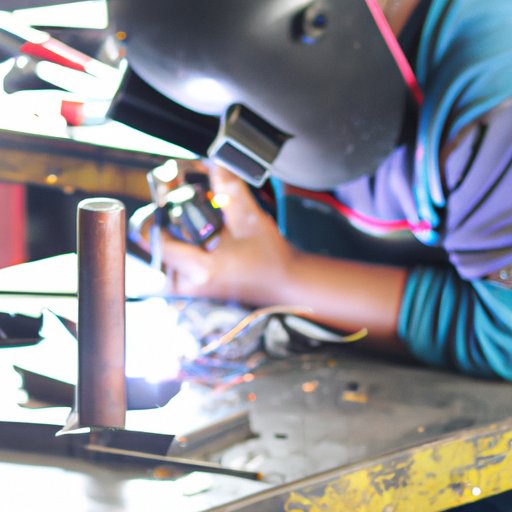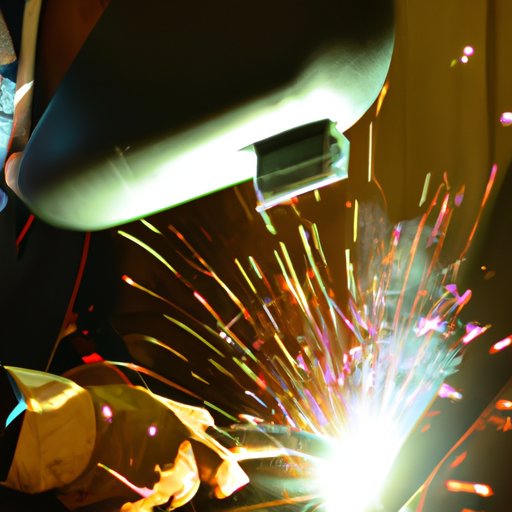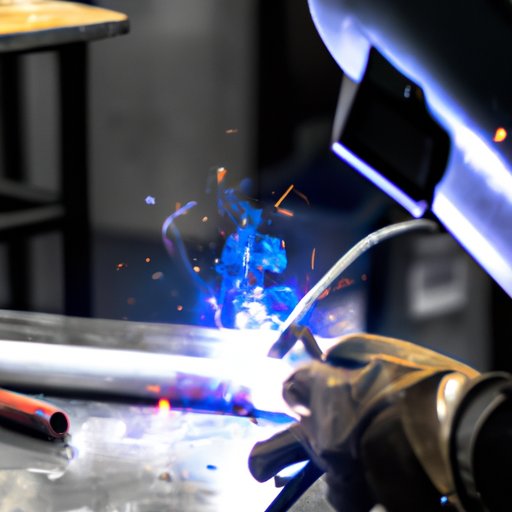Introduction
Welding is an incredibly versatile profession that has many applications in various industries. From automotive to aerospace, welders are essential for creating strong and secure connections between metal components. As a result, welders are always in high demand. One popular option for welders is to become a traveling welder.
A traveling welder is a professional who travels from one job site to another to work on various projects. This type of work requires flexibility and the ability to adapt quickly to different environments. It also requires specialized skills and knowledge of different welding techniques. If you’re interested in becoming a traveling welder, this comprehensive guide will provide you with the information you need to get started.

Research the Different Types of Welding and Choose a Specialty
The first step in becoming a traveling welder is to research the different types of welding and choose a specialty. There are several common welding processes such as arc welding, oxy-fuel welding, and tungsten inert gas (TIG) welding. Each process has its own unique set of challenges and benefits, so it’s important to research each one thoroughly before making a decision.
Advantages of specializing in one type of welding include increased efficiency, a better understanding of the process, and the ability to develop more advanced skills. Additionally, some employers may require specific certifications or experience in a particular welding process. Therefore, it’s important to make sure you have the necessary qualifications before applying for jobs.
Obtain the Necessary Certifications
Once you’ve chosen a specialty, the next step is to obtain the necessary certifications. Depending on where you live, there may be different requirements for certifications. Generally speaking, most employers will require welders to have a minimum level of certification, such as a Welding Inspector Certification or a Certified Welding Fabricator Certificate.
You can find out what certifications are required in your area by researching local welding regulations and contacting local employers. Additionally, there are several organizations that offer welding certification programs. The American Welding Society (AWS) is one of the most well-known organizations, and they offer a variety of certification courses.
Develop Your Skills Through Practice and Experience
Once you’ve obtained the necessary certifications, the next step is to start developing your skills through practice and experience. One way to do this is to join a welding club or organization. These clubs typically offer classes and workshops that allow members to hone their skills and gain valuable experience. Additionally, clubs often provide access to welding equipment that can be used for practice.
Another way to develop your skills is to volunteer for welding projects in your community. This is a great way to gain firsthand experience and learn from experienced welders. Additionally, volunteering can help you build relationships with potential employers and gain references for future job opportunities.

Learn How to Create a Professional Portfolio
In order to stand out from other welders and increase your chances of getting hired, it’s important to create a professional portfolio. A portfolio is a collection of your work samples and certifications that shows potential employers what you’re capable of. It should include samples of your best work, photos of completed projects, letters of recommendation, and any relevant certifications.
When creating a portfolio, it’s important to make sure all of your samples are up-to-date and accurate. Additionally, it’s helpful to include a brief summary of each sample that outlines the project and explains what you did. Finally, make sure to keep your portfolio organized and easy to navigate.
Network with Other Professionals in the Field
Networking is an important part of any job search, and it’s especially important for welders looking for traveling positions. Building relationships with other professionals in the field can open up new opportunities and help you stay informed about job openings. Additionally, networking can help you find mentors and advisers who can provide valuable guidance and advice.
There are a variety of ways to network, including attending professional conferences, joining online forums and discussion groups, and connecting with people on social media. Additionally, you can reach out to local employers and inquire about job openings. Regardless of which method you choose, it’s important to be professional and courteous when networking.

Find Out What Employers are Looking for in a Traveling Welder
Before applying for any job, it’s important to research what employers are looking for in a traveling welder. Generally speaking, employers will want welders who have experience in a variety of welding processes, have reliable transportation, and can work independently. Additionally, employers may require welders to have certain certifications or qualifications.
You can find out what employers are looking for by researching job postings and talking to industry professionals. Additionally, there are websites and publications dedicated to helping welders find job opportunities. These resources can provide valuable information about the types of jobs available and the qualifications needed to apply.
Market Yourself Effectively as a Traveling Welder
Once you’ve gathered the necessary qualifications and found job opportunities, the next step is to market yourself effectively as a traveling welder. This involves creating a professional resume, developing an online presence, and staying active in the welding community. Additionally, it’s important to be prepared for interviews and make a good impression on potential employers.
One way to promote yourself as a traveling welder is to create a website that showcases your work and certifications. Additionally, you can use social media to connect with other professionals in the field and build relationships with potential employers. Finally, it’s important to stay up-to-date on industry trends and news, as this can help you stay ahead of the competition.
Conclusion
Becoming a traveling welder requires dedication and hard work, but the rewards can be significant. With the right preparation and training, you can gain the skills and experience necessary to succeed in this field. From researching different welding processes to obtaining certifications and developing your skills, the resources provided in this guide will help you take the first steps towards becoming a successful traveling welder.
(Note: Is this article not meeting your expectations? Do you have knowledge or insights to share? Unlock new opportunities and expand your reach by joining our authors team. Click Registration to join us and share your expertise with our readers.)
